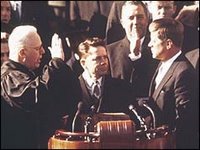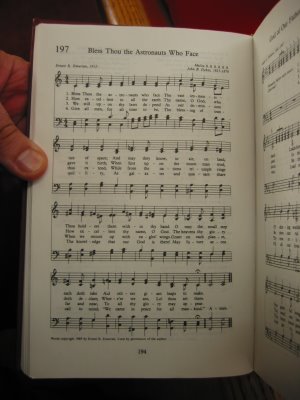
Best,
Andy
Hussein's execution was widely reported (here and in Iraq) at 6:10 am Baghdad time, which is 9:10 pm Crawford, Texas time. In 2004, President Bush fell asleep during the first half of the Super Bowl, missing the Janet Jackson brouhaha.At President Bush’s ranch in Crawford, Tex., a White House spokesman, Scott Stanzel, said Mr. Bush had gone to bed before the execution took place and was not awakened. Mr. Bush had received a briefing from his national security adviser Friday afternoon, when he learned the execution would be carried out within hours, Mr. Stanzel said. Asked why Mr. Bush had gone to sleep before hearing the news, he said Mr. Bush “knew that it was going to happen.”

 You know finals are here when tempting eat-up-your-time-in-big-bites web-based video games just reveal themselves to you.
You know finals are here when tempting eat-up-your-time-in-big-bites web-based video games just reveal themselves to you.On June 10, 1964, during the roll call for the historic, successful effort to break the filibuster on what would become the Civil Rights Act of 1964, when the clerk reached "Mr. Engle," there was no reply. A brain tumor had robbed Senator Engle of his ability to speak. Slowly lifting a crippled arm, he pointed to his eye, thereby signaling his affirmative vote ("aye"). Few who witnessed Engle's brave act forgot it. Nine days later the Senate approved the act itself—producing one of America's towering 20th century legislative achievements.Senator Engle died a month and a half later.
Andy,I suspect that the inclusion of all these terms on my blog will change the context-sensitive Google Ads on this page through the end of the year.
As we approach the holiday season, I thought I'd investigate the various spelling of the Jewish holiday. I have found four common binary variations: Ch/H, n/nn, k/kk, and a/ah. The following is a list of the sixteen permutations, in order of the number of results from a Google search of each permutation.
Perhaps readers of your blog would appreciate this analysis?
Hanukkah — 12,100,000
Chanukah — 3,400,000
Hanukah — 1,010,000
Hannukah — 790,000
Chanuka — 545,000
Hanuka — 518,000
Channukah — 437,000
Chanukkah — 315,000
Chanukka — 301,000
Hanukka — 107,000
Hannuka — 62,500
Hannukkah — 44,200
Channuka — 18,800
Channukka — 1,750
Hannukka — 821
Channukkah — 741
Note that Microsoft Word reports that all but the top three spellings are incorrect.
CSK
Working hard, aren't you?
The two variables about which I feel most strongly are the doubled consonants. The correct answer: one N, two K's. In proper Hebrew pronunciation, the kaf is doubled because it contains a dagesh chazak. In other words, the word would be broken into syllables as ha-nuk-kah rather than ha-nu-kah. (Several other Hebrew loan words are spelled with doubled consonants for the same reason - e.g. sabbath, hallelujah.) Granted, since most people don't pronounce dagesh chazak properly any more, I suppose it's reasonable to write only one K. The thing that's definitely wrong, though, is two N's. I'd guess that those spellings come largely as a result of people remembering that there's a doubled consonant but getting the wrong one.
As to the H vs. CH, question, obviously H with a dot underneath is the most ideal option, but that's hard to do on most word processors. I tend to use H here, but I admit that I sometimes use CH for het in some other contexts. If there's no option of having a dot, I'd say the CH is the best bet. Another spelling that occurs 1,290 times on Google is Khanuka (and variants), but I think it would be better to reserve KH for khaf and CH or H-dot (or h-bar!) for het. That distinction has been lost in Ashkenazi and modern Israeli Hebrew, but I'm pretentious that way. Another neat option is what Bryan/Aviel and other Sephardim do: Januk(k)a(h) (along with Pesaj).
As to the final H, it seems at first glance that the Hebrew spelling (with a hei) would mandate the H. However, a deeper analysis of Hebrew linguistics actually offers a rather compelling argument not to include the H. The details are too complicated to explain here, though.
 The American Family Association – worried that newly-elected Representative Keith Ellison (D-MN), who happens to be Muslim, will be sworn in with his hand on the Koran (instead of the Christian Bible) – is urging its members to do the following:
The American Family Association – worried that newly-elected Representative Keith Ellison (D-MN), who happens to be Muslim, will be sworn in with his hand on the Koran (instead of the Christian Bible) – is urging its members to do the following:Never mind that Representatives don't place their hands on anything when they're sworn in en masse. How the AFA-proposed law wouldn't violate Article VI, Section 3 is beyond me:
- Send an email asking your U.S. Representative and Senators to pass a law making the Bible the book used in the swearing-in ceremony of Representatives and Senators.
- Forward this email to your friends and family today!
The Senators and Representatives before mentioned, and the members of the several state legislatures, and all executive and judicial officers, both of the United States and of the several states, shall be bound by oath or affirmation, to support this Constitution; but no religious test shall ever be required as a qualification to any office or public trust under the United States. (emphasis added)Too many more oversights like this and I'm going to stop turning to the American Family Association for my constitutional theory.
 Last Thursday, Lame Duck Virginia Senator George Allen proposed SB 4057, tentatively titled The National Park Second Amendment Restoration and Personal Protection Act of 2006. According to the current description of the bill, it would "protect the second amendment rights of individuals to carry firearms in units of the National Park System." If passed, it would permit a properly licensed individual to carry a concealed weapon in a National Park.
Last Thursday, Lame Duck Virginia Senator George Allen proposed SB 4057, tentatively titled The National Park Second Amendment Restoration and Personal Protection Act of 2006. According to the current description of the bill, it would "protect the second amendment rights of individuals to carry firearms in units of the National Park System." If passed, it would permit a properly licensed individual to carry a concealed weapon in a National Park. Zombie Amendments:
Zombie Amendments: Congressional Apportionment Amendment: This proposed amendment was the first of the original twelve amendments proposed to Congress (The original 2nd Amendment eventually became the 27th Amendment mentioned above). If passed, the amendment would have restricted the original size of the House of Representatives to 100 representatives, with later enlargements to be determined by Congress. From 1789 to 1792, 11 states ratified this amendment, leaving it two states short of ratification.
Congressional Apportionment Amendment: This proposed amendment was the first of the original twelve amendments proposed to Congress (The original 2nd Amendment eventually became the 27th Amendment mentioned above). If passed, the amendment would have restricted the original size of the House of Representatives to 100 representatives, with later enlargements to be determined by Congress. From 1789 to 1792, 11 states ratified this amendment, leaving it two states short of ratification.No amendment shall be made to the Constitution which will authorize or give to Congress the power to abolish or interfere, within any State, with the domestic institutions thereof, including that of persons held to labor or service by the laws of said State.Apart from its subject matter, the language of this amendment raises an important issue in U.S. Constitutional theory: Can a Constitutional amendment prohibit a later amendment through an entrenched clause?
 Child Labor Amendment: Proposed in 1924 and ratified by 28 states, this still-pending amendment requires the approval of 10 more states in order to restrict to the federal government all power to regulate labor of persons under 18 years old.
Child Labor Amendment: Proposed in 1924 and ratified by 28 states, this still-pending amendment requires the approval of 10 more states in order to restrict to the federal government all power to regulate labor of persons under 18 years old.H. J. RES. 14 — Proposing an amendment to the Constitution of the United States relative to abolishing personal income, estate, and gift taxes and prohibiting the United States Government from engaging in business in competition with its citizens.Yeah... Good luck with that one, Mr. Paul.
 Wikipedia: U.S. Presidential Line of Succession
Wikipedia: U.S. Presidential Line of SuccessionThe Poor Voter on Election DayToday, when voters across America cast their vote for their representative in the House of Representatives, they exercise the only voting right granted to them by the Constitution, the Senate being chosen by state legislatures until 1913, and the President chosen by The Electors.
by John Greenleaf Whittier
December 23, 1852
The proudest now is but my peer
The highest not more high.
Today, of all the weary year,
A king of men am I!
Today alike are great and small,
The nameless and the known.
My place is the people's hall,
The ballot box my throne.
Who serves today upon the list
Beside the served shall stand;
Alike the brown and wrinkled fist,
The gloved and dainty hand!
The rich is level with the poor,
The weak is strong today.
And sleekest broadcloth counts no more
Than homespun frock of gray.
Today let pomp and vain pretence
My stubborn right abide.
I set a plain man's common sense
Against the pedant's pride.
Today shall simple manhood try
The strength of gold and land;
The wide world has not wealth to buy
The power in my right hand.
While there's a grief to seek redress
Or balance to adjust,
Where weighs our living manhood less
Than Mammon's vilest dust -
While there's a right to need my vote
A wrong to sweep away,
Up! Clouted knee and ragged coat -
A man's a man today!
As he was writing Bleak House over the course of 1852 & 1853, Charles Dickens was aware of numerous cases mired for decades in the Courts of Chancery. Although his case of Jarndyce & Jarndyce was fiction, he knew the plodding reputation of the English courts at the time would make his case appear real to his 19th Century British audience.2At the present moment (August, 1853) there is a suit before the court which was commenced nearly twenty years ago, in which from thirty to forty counsel have been known to appear at one time, in which costs have been incurred to the amount of seventy thousand pounds, which is A FRIENDLY SUIT, and which is (I am assured) no nearer to its termination now than when it was begun.
Charles Dickens, Preface to Bleak House (1853)
The case had been frequently before this court in various aspects; first, in 13 Peters, 404, then in 15 Peters, 9, 2 Howard, 619, 6 Howard, 552, 15 Howard, 473. In some of these reports large extracts are made from the record, illustrating the points of law and fact then under consideration, and also the evidence in support of them. All of this past history was brought again to the notice of the court in the argument of the present case, which cannot be again recited in the present report. The reader who wishes to understand all the points which are discussed in the opinion of the court must turn back to the preceding volumes above cited, and follow the case through its successive developments. He will then be able to appreciate the concluding remark in the opinion of the court, which is as follows:
"When hereafter some distinguished American lawyer shall retire from his practice to write the history of his country's jurisprudence, this case will be registered by him as the most remarkable in the records of its courts."
Gaines v. Hennen, 65 U.S. 553 (U.S. 1861) (reporter's note) (emphasis added).1
Besides its longevity, the Gaines case is legally interesting for a number of reasons. First and foremost, the Gaines case is a case about antebellum federal power — particularly about the scope of federal power in a state jurisdiction governed by civil law. Moreover, the case concerns the use of federal equity jurisdiction to govern a matter of domestic relations, an area where today's federal courts are loathe to exert their influence.7The events that formed the basis for the Gaines case began in 1787 when Daniel Clark arrived in New Orleans to join his uncle, Colonel Daniel Clark, in business. Ten years later, Colonel Clark conveyed all of his extensive property in Louisiana to his nephew, and at the age of thirty, Daniel Clark found himself one of the richest men in North America.
Clark's many business ventures brought him large revenues that he invested primarily in New Orleans real estate. During the early years of the nineteenth century, as he established himself in New Orleans as "a man of much personal pride and social ambition," Clark became romantically involved with a young Frenchwoman. All accounts of Zuileme Carrière emphasized her extraordinary beauty, vivacity, and charm, and both sides of the lawsuit admitted Clark's fascination with her.
Myra, daughter of Clark and Carrière, later came to believe that her parents had contracted a legal, though secret, marriage, making her the true heir to Clark's fortune. As she grew up, however, she was raised by friends of Clark and kept in ignorance of her real parentage as well as of her father's death in 1813, when she was nine.
Nearly twenty years afterward, Myra and her young husband arrived in New Orleans with a tale of a lost will and a claim that she was the true heir. Few believed her story. For the rest of her life, as a young wife and mother, as the third wife of a prominent general, and as a widow, Myra Clark Gaines pursued the vindication of her "rights."6

John Kerry is not funny. Neither is the situation in Iraq that Republican candidates are distancing themselves from.They Think You're Dumb, America.


I don’t think we should deny people rights to a civil union, a legal arrangement, if that’s what a state chooses to do so. … I strongly believe that marriage ought to be defined as between a union between a man and a woman. Now, having said that, states ought to be able to have the right to pass laws that enable people to be able to have rights like others.I guess we'll just have to wait and see what his handlers tell him to think now.

| Los Angeles | New York City |
 |  |
| Dallas/Ft. Worth | Philadelphia |
 |  |

I WILL ALARM ISLAMIC OWLS
WILLIAM CARLOS WILLIAMS
I will be alarming
the Islamic owls
that are in
the barn
and which
you warned me
are very jittery
and susceptible to loud noises
Forgive me
they see so well in the dark
so feathery
and so dedicated to Allah
nice smug me
e. e. cummings
this here verse’s
disjunct
i used to
stick to regular metered
poetry
now i write onetwothreefourfive poemsjustlikethat
Jesus
but this is simple work
and what i want to know is
how much am i going to get paid for this
mister editor
SUZANNE MALVEAUX, CNN: Thank you, Mr. President. Back on Iraq, a group of American and Iraqi health officials today released a report saying that 655,000 Iraqis have died since the Iraq war. That figure is 20 times the figure that you cited in December at 30,000. Do you care to amend or update your figure and do you consider this a credible report?
PRESIDENT BUSH: No, I don’t consider it a credible report, neither does General Casey and neither do Iraqi officials. I do know that a lot of innocent people have died and it troubles me and grieves me. And I applaud the Iraqis for their courage in the face of violence. I am, you know, amazed that this is a society which so wants to be free that they’re willing to — you know, that there’s a level of violence that they tolerate.
 Staying ahead in business requires constant innovation — finding new ways to make money before the other guy beats you to it.
Staying ahead in business requires constant innovation — finding new ways to make money before the other guy beats you to it.
 I was unaware that Pope Benedict XVI had the authority to abolish limbo, but apparently he does.
I was unaware that Pope Benedict XVI had the authority to abolish limbo, but apparently he does. 

The central conservative truth is that it is culture, not politics, that determines the success of a society.
The central liberal truth is that politics can change a culture and save it from itself.
 This case will do to cast doubt onto clouds of suspicion in the same way that Kitty Genovese cast doubt on the idea that someone else will call the police.
This case will do to cast doubt onto clouds of suspicion in the same way that Kitty Genovese cast doubt on the idea that someone else will call the police. If you decide to show off in front of your co-workers and order the durian-flavored ice cream, know that any burps you have for the rest of the day are going to smell a little bit like carrion.
If you decide to show off in front of your co-workers and order the durian-flavored ice cream, know that any burps you have for the rest of the day are going to smell a little bit like carrion.No Soldier shall, in time of peace be quartered in any house, without the consent of the Owner, nor in time of war, but in a manner to be prescribed by law.Cornell's Annotated Constitution claims:
There has been no Supreme Court explication of this Amendment, which was obviously one guarantee of the preference for the civilian over the military. In fact, save for the curious case of Engblom v. Carey, 677 F. 2d 957 (2d Cir. 1982), on remand, 572 F. Supp. 44 (S.D.N.Y.), aff’d. per curiam, 724 F.2d 28 (2d Cir. 1983), there has been no judicial explication at all.Au contraire. No fewer than seven cases have mentioned this sacred protective amendment, at least three of which bear mentioning.
No State shall, without the Consent of Congress, lay any Duty of Tonnage, keep Troops, or Ships of War in time of Peace, enter into any Agreement or Compact with another State, or with a foreign Power, or engage in War, unless actually invaded, or in such imminent Danger as will not admit of delay. (emphasis added)Since a state could not maintain soldiers other than with the approval of Congress, since the Third Amendment says "No Soldier," not "no federal soldier," and since the Third Amendment provides a logical backstop to the militia power defined in the Second Amendment, it appears to me that the Third Amendment would have logically applied to the states before the Fourteenth Amendment made it so.


 Having gone through the Lincoln Tunnel at 5:30 am this morning — the very day that the abortive (and physically impossible) plan to somehow flood lower Manhattan (which is above sea level) via damaging/destroying the various tunnels leading to Manhattan (which are below sea level) was publicly disclosed — I've determined that I am now worthy of joining the 101st Fighting Keyboarders.
Having gone through the Lincoln Tunnel at 5:30 am this morning — the very day that the abortive (and physically impossible) plan to somehow flood lower Manhattan (which is above sea level) via damaging/destroying the various tunnels leading to Manhattan (which are below sea level) was publicly disclosed — I've determined that I am now worthy of joining the 101st Fighting Keyboarders.Law may not be the most lucrative career, or the most glamorous, but it's the most arduous, and that's something to be proud of.


 As I've said time and again, Pat Robertson's going to say something kooky to get in the news roughly every 50 days.
As I've said time and again, Pat Robertson's going to say something kooky to get in the news roughly every 50 days. Seriously, at this point our tongue-tied President is just messing with us.
Seriously, at this point our tongue-tied President is just messing with us.